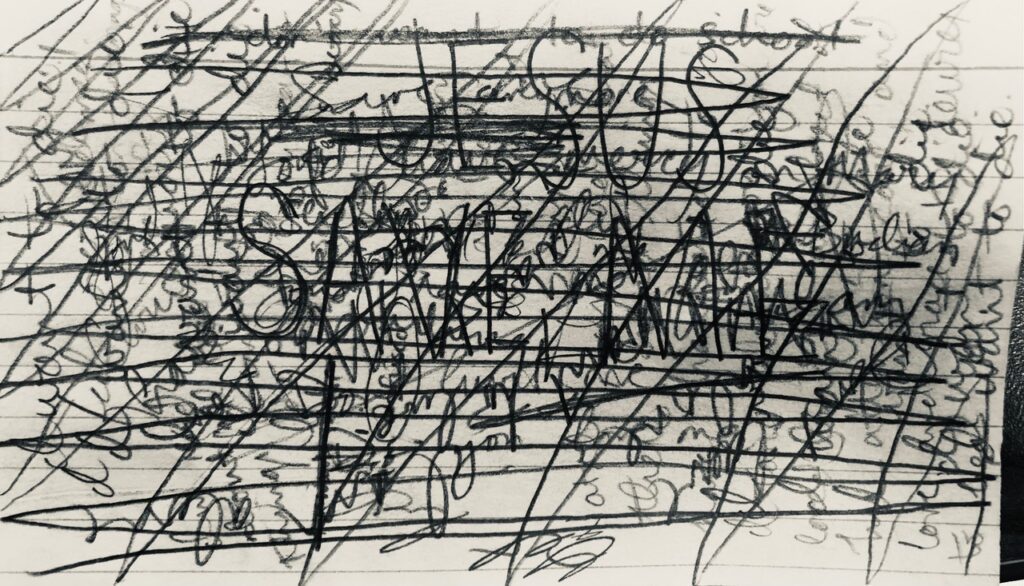
“A man that looks on glass,
On it may stay his eye;
Or if he pleaseth, through it pass,
And then the heav’n espy.”
These lines from George Herbert’s poem, “The Elixir,” encapsulate much of my experience of OCD, and they encourage me to have hope even as I continue to struggle with this disorder. These lines use a simple image of glass to convey a powerful truth. When looking at a piece of glass, we can at times find ourselves staring back at ourselves, unable to see anything beyond. Our eye is “stayed,” as Herbert writes, and we remain blinded to what lies on the other side. Yet, the beauty of glass lies in its ability to direct our vision to something beyond itself, allowing us to see what otherwise we might have missed. When we look through a window, we may, as Herbert writes, espy heaven.
While at first, I could see only suffering and fear in the “glass” of OCD, my experience with OCD has truly become a window for me to experience goodness and love in ways that I don’t know I would have experienced without this disorder.
OCD struck me quickly and fiercely last fall. As I moved to a new state to start graduate school, I began to have intrusive thoughts about harming myself. The image of slitting my wrists with razors frequently came into my thoughts. I couldn’t understand where these thoughts were coming from, and I tried to push them away and focus on my schoolwork. But the thoughts did NOT like to be ignored, and they started happening more and more frequently. I tried everything I knew to make them stop: I would redirect my thoughts or replace the thought with a positive phrase about myself. I even reimagined a different ending to the image (where God came and healed the cuts on my wrist) that I tried to think of every time the harm images would come up. I thought that thinking something positive would counteract the disturbing thoughts and make them go away, but the more I fought them, the more intense they became, until I was having near constant obsessive thoughts.
Funnily enough, my primary compulsion for OCD developed out of a school homework assignment. In one of my theology classes, we were given different prayer practices to try out for a week at a time. One of the practices consisted of praying the “Jesus prayer,” a very short prayer that is meant to be prayed repetitively throughout each day. The idea is that by doing so you will “pray without ceasing.” It is very common in Eastern Orthodox spirituality. So, being the good student that I am, I started praying the Jesus prayer with gusto, and to my great surprise, it was EXTREMELY effective at zapping away the anxiety I felt from the intrusive thoughts. I found that if I was constantly repeating the prayer in my head, there was no space for intrusive thoughts! It was far more effective than any other strategy I had tried before! The only problem was….I couldn’t stop. I linked the prayer to my breath, and so with every inhale and exhale I was saying this prayer over and over and over again. If I stopped for a moment, the intrusive thoughts returned and my anxiety skyrocketed. I quickly became trapped in a deadly cycle: intrusive thought, prayer, intrusive thought, prayer, prayer, prayer. Not a single breath passed without obsessions and compulsions. I was a prisoner inside my tormented mind, and my health rapidly deteriorated. I could no longer pay attention in class. I couldn’t do my homework. I struggled to hold a conversation. I stopped sleeping.
To make matters worse, in order to cope with my anxiety and distress, I started pinching and scratching my arms and face. This merely confirmed my fears that I was going to cut myself or commit suicide as my thoughts suggested. I became very depressed, feeling so alone and so scared. I could hardly see anything beyond my suffering.

When I finally confided in my therapist about what was going on, she referred me to a Partial Hospitalization Program for anxiety and OCD. I started going to therapy for 6 1/2 hours a day, 5 days a week. This was the beginning of my recovery. I began doing ERP (Exposure and Response Prevention) for hours every day, facing my fears while resisting the urge to do my compulsions. The days were very dark, and yet glimmers of light began to pierce through the suffering.

The first bright light came in the form of a girl. She was the teenage daughter of a family affiliated with my school. As I struggled with OCD, largely isolated from my friends and family back home, this family opened their home and their hearts to support me. As I spent time with this family, I befriended their daughter who also struggled with anxiety and depression. She struggled to let people into her pain, but, perhaps because she knew that I was fighting a similar battle, she opened up to me and let me love her, becoming like a little sister to me. My own pain made space for hers, allowing me to love and serve her in a unique way. I remember one evening at their house, the girl emerged from her room with fresh cuts on her arm. The image that had tormented me for months stared back at me, but instead of fear, I was flooded with compassion for her. I helped her bandage the cuts, hugged her, and then prayed with her. Though difficult, it was a tender and redemptive moment, for I realized that my own struggles enabled me to love this girl.
I started seeing the heaven on the other side of the glass.
OCD also provided opportunities for me to experience love from others. Because of the severity of my OCD, living alone proved immensely difficult, so my mother took a month off of work to stay with me and support me as I sought recovery. This time offered our strained relationship a new chance for restoration. As she held me once as I wept, I felt the walls between us start to crumble, and we shared a new closeness in our relationship that had eluded us for years. My neediness became a healing gift.
The brightest light came in the form of a man. While I was still in intensive therapy, I began dating one of my classmates from school. At first, I felt ashamed of my struggles with OCD, and I sought to put on a brave face and conceal my difficulties from him. However, I found that my OCD provided opportunities for closeness to develop between us, as he has patiently loved and cared for me throughout my journey with this disorder. His gentleness and kindness towards me in this area fostered much love and intimacy between us, and I am thrilled that we have recently gotten engaged!
After months of intensive ERP therapy, and through the support of family and friends, I regained my health and my sanity! I can now attend class, complete my schoolwork, enjoy the sunshine, pursue my passions, and experience peace. I am enormously grateful for ERP, the community of NOCD which made me feel less alone, and all those who have supported me and who continue to encourage me.

I don’t know if I’m ready yet to say “I’m grateful for OCD” – the pain of it all is still too fresh, and every now and then the thoughts still return, and I struggle. But as real as the suffering has been (and believe me, it’s real), the love and joy and intimacy I have experienced has also been real, maybe even more real. And the wonderful (if not baffling) reality is that the love and friendship came not in spite of OCD, but because of it. I thought I needed the suffering to dissipate completely so that I could experience joy; I never thought that suffering itself would usher me into joy’s presence.
This paradox is embedded in the very practice of ERP. How do you escape the torment of intrusive thoughts? You face them, intentionally exposing yourself to the things that cause you the most distress. Healing from OCD occurs not by running away from the difficulties and fears, but by surrendering to and accepting the hardships. It is through the fire that freedom lies.
My experience with OCD has rooted me in hope, for I have learned that my struggles need not be opaque walls or echo chambers of pain. OCD does not have the final word in my story. On the contrary, as George Herbert tells us in the poem quoted at the beginning, these difficulties may be transformed by grace into portals of heaven.

